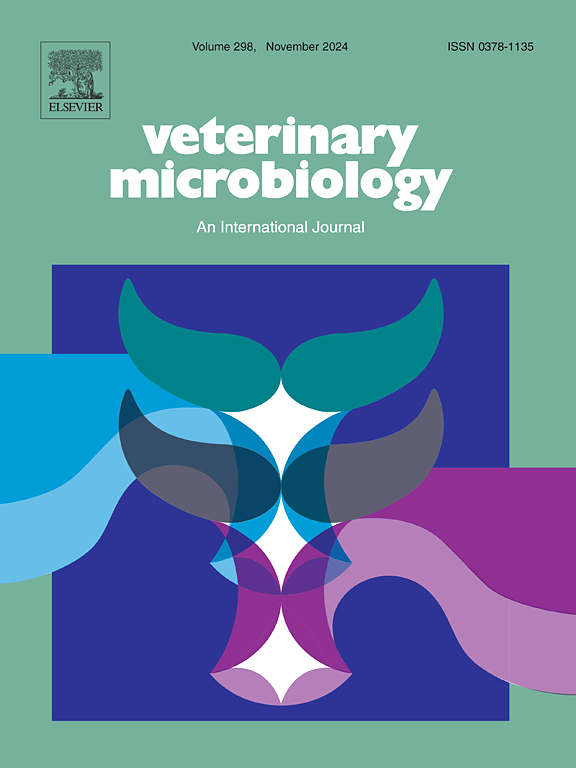Genetic regulation of short chain fatty acid on Leghorn male hepatoma cells infected with Fowl Adenovirus serotype-4
IF 2.7
2区 农林科学
Q3 MICROBIOLOGY
引用次数: 0
Abstract
Fowl Adenovirus serotype 4 (FAdV-4) infection causes hepatitis-hydropericardium syndrome (HHS), a disease with high mortality in poultry. Short chain fatty acids (SCFAs) are a major gut metabolite that strengthens barrier function, impacts microbiome dynamics, and enhances protective immunity. Among SCFAs, butyrate has been suggested to promote anti-inflammatory effect that reduces tissue damage during viral infections. In this study, we pre-treated Leghorn male hepatoma (LMH) cell line with butyrate, infected them with FAdV-4, and examined genetic regulation related to protective immunity. Differentially expressed genes (DEGs) were identified through RNA sequencing, revealing significant alterations in various cellular pathways during FAdV-4 infection. Butyrate restored the expression of several genes involved in metabolic pathways, including the PPAR pathway. Additionally, butyrate reduced the expression of the anti-viral molecule Oasl and while upregulating il8, which plays a role in immune cell recruitment. These findings suggest that butyrate supports a beneficial antiviral response in host cells during FAdV-4 infection. This study provides the role of SCFAs in modulating host defense mechanisms against avian viral infections.
短链脂肪酸对4型禽腺病毒感染莱格霍恩雄性肝癌细胞的遗传调控
禽腺病毒血清型4 (FAdV-4)感染可引起肝炎心包积液综合征(HHS),这是一种在家禽中具有高死亡率的疾病。短链脂肪酸(SCFAs)是一种主要的肠道代谢物,可以增强屏障功能,影响微生物群动力学,增强保护性免疫。在scfa中,丁酸盐被认为可以促进抗炎作用,减少病毒感染期间的组织损伤。本研究用丁酸盐预处理Leghorn雄性肝癌(LMH)细胞系,用FAdV-4感染,检测与保护性免疫相关的基因调控。通过RNA测序鉴定出差异表达基因(DEGs),揭示了FAdV-4感染期间各种细胞通路的显著变化。丁酸盐恢复了几个参与代谢途径的基因的表达,包括PPAR途径。此外,丁酸降低了抗病毒分子Oasl的表达,同时上调了在免疫细胞募集中起作用的il - 8。这些发现表明,在FAdV-4感染期间,丁酸盐支持宿主细胞的有益抗病毒反应。本研究提供了SCFAs在调节宿主对禽流感病毒感染的防御机制中的作用。
本文章由计算机程序翻译,如有差异,请以英文原文为准。
求助全文
约1分钟内获得全文
求助全文
来源期刊

Veterinary microbiology
农林科学-兽医学
CiteScore
5.90
自引率
6.10%
发文量
221
审稿时长
52 days
期刊介绍:
Veterinary Microbiology is concerned with microbial (bacterial, fungal, viral) diseases of domesticated vertebrate animals (livestock, companion animals, fur-bearing animals, game, poultry, fish) that supply food, other useful products or companionship. In addition, Microbial diseases of wild animals living in captivity, or as members of the feral fauna will also be considered if the infections are of interest because of their interrelation with humans (zoonoses) and/or domestic animals. Studies of antimicrobial resistance are also included, provided that the results represent a substantial advance in knowledge. Authors are strongly encouraged to read - prior to submission - the Editorials (''Scope or cope'' and ''Scope or cope II'') published previously in the journal. The Editors reserve the right to suggest submission to another journal for those papers which they feel would be more appropriate for consideration by that journal.
Original research papers of high quality and novelty on aspects of control, host response, molecular biology, pathogenesis, prevention, and treatment of microbial diseases of animals are published. Papers dealing primarily with immunology, epidemiology, molecular biology and antiviral or microbial agents will only be considered if they demonstrate a clear impact on a disease. Papers focusing solely on diagnostic techniques (such as another PCR protocol or ELISA) will not be published - focus should be on a microorganism and not on a particular technique. Papers only reporting microbial sequences, transcriptomics data, or proteomics data will not be considered unless the results represent a substantial advance in knowledge.
Drug trial papers will be considered if they have general application or significance. Papers on the identification of microorganisms will also be considered, but detailed taxonomic studies do not fall within the scope of the journal. Case reports will not be published, unless they have general application or contain novel aspects. Papers of geographically limited interest, which repeat what had been established elsewhere will not be considered. The readership of the journal is global.
 求助内容:
求助内容: 应助结果提醒方式:
应助结果提醒方式:


